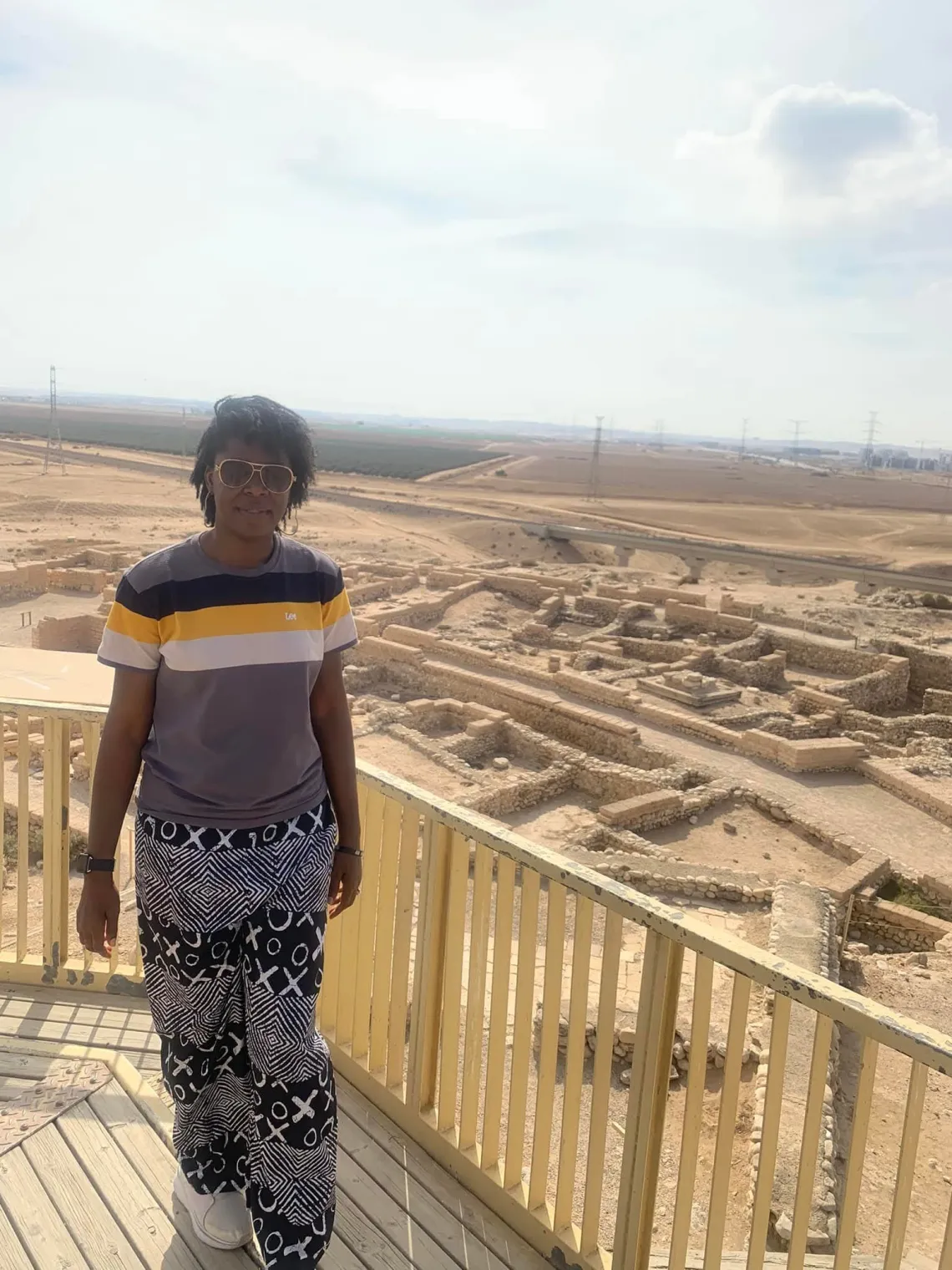“Whenever sirens blared, students and residents scrambled to bomb shelters, underground spaces reinforced to withstand rocket fire.”
Shortly before sunrise on 19 June 2025, residents of Beersheba, a southern Israeli city, were woken by blaring sirens and missile alerts on their phones. The warnings gave them only minutes to take cover.
For Blessing Eje, a Nigerian postgraduate student at Ben-Gurion University of the Negev, those alarms had become an unwelcome part of life in Israel. But that morning, the danger drew closer than ever.
“The first missile fell on Soroka Medical Centre, just opposite our campus,” she recalled. “The building shook so badly. Parts of my school were affected. We were only separated from the hospital by a two-lane road.”
The following day, another blast rocked Beersheba, a city of about 600,000. It was the second strike in as many days. The university quickly relocated students to its Sde Boker campus further south. For Ms Eje, that was the breaking point.

“I told myself that I had to find a way to leave,” she said.
Ms Eje, who arrived in Israel in October 2024, said the reality of living under constant rocket fire became overwhelming.
Advertisement

To order your copy, send a WhatsApp message to +1 317 665 2180
“Whenever sirens blared, students and residents scrambled to bomb shelters, underground spaces reinforced to withstand rocket fire. At first, I panicked every time. But after a while, it became routine. You just run to the nearest shelter and wait. Sometimes it was minutes, sometimes longer,” she told PREMIUM TIMES.
Though student residences were built underground with thick walls, the psychological toll was heavy. “The sound of the alarms alone can paralyse you. Even when nothing falls near you, you feel the vibration, the impact. Your heart races all the time.”
How the war began
The crisis erupted on 13 June, when Israeli strikes hit multiple targets in Tehran. Iran retaliated with waves of ballistic missiles and drones.
For two weeks, Israel and Iran exchanged heavy fire in the fiercest confrontation between the two nations in decades. The conflict escalated when the United States struck three nuclear sites in Iran. A ceasefire followed. Eventually, over two dozen people were killed in Israel during the war, and over two thousand were injured. Hundreds of people were killed in Iran,
Silence from Home
As the war deepened, countries around the world began evacuating their citizens. Nigerians in Israel, however, felt abandoned.

“The painful part of the ordeal was not the bombs, but the silence from the Nigerian government,” Ms Eje said.
She said that Nigerian students in Israel had a WhatsApp group which included Abike Dabiri-Erewa, chairperson of the Nigerians in Diaspora Commission (NIDCOM). “But when the bombs started falling, there was no serious communication. Other embassies were checking on their citizens directly. Ours was quiet.”
On 14 June, Nigeria condemned Israel’s strike and called for restraint. By 17 June, the Ministry of Foreign Affairs announced that arrangements were being finalised to evacuate Nigerians in Israel and Iran.
But those promises never materialised. “An official of the Nigerian embassy told me the government was planning evacuation, but there was nothing concrete at the time,” Ms Eje recalled.
A risky escape
With no official evacuation, Ms Eje decided to take matters into her own hands. She joined another Nigerian student, Timothy James (not his real name), who was desperate to return home for his wedding.
They sought transit visas to cross into Jordan. Embassy officials assured them verbally that approvals had been granted, but no documents were issued.
On 22 June, they boarded a bus from Beersheba to Tel Aviv, then onward to the Jordan River crossing — a three-hour journey interrupted twice by rocket sirens.
“The first time, the driver found a filling station with an underground shelter. The second time, there was nowhere to hide. Everyone just stood under a bridge until it was safe,” Ms Eje said.
At the border, their names were not on the official list of evacuees. They were forced to pay $115 each before they were allowed through. From Jordan, they booked flights to Nigeria and completed their journey without any help from their government.
A recurring pattern
Ms Eje’s ordeal highlights a recurring problem for Nigerians stranded in conflict zones.
In 2011, during Libya’s civil war, many Nigerians complained of delays in evacuation. In 2022, Nigerian students fleeing Russia’s invasion of Ukraine were stuck at European borders for days before evacuation flights began. In 2023, thousands trapped in Sudan endured weeks of uncertainty before airlifts were arranged, with many forced to risk dangerous trips to Egypt on their own.
Experts say the problem lies in Nigeria’s weak diaspora management.
“Nigeria lacks a reliable database of its citizens abroad, making evacuation chaotic during emergencies,” said Sunday Adejoh, a lecturer in International Affairs and Diplomacy.
“Evacuation of citizens in conflict zones is not captured in Nigeria’s diaspora policy. There should be a standby logistical arrangement for prompt intervention. Without that, responses are always slow and uncoordinated.”
Mr Adejoh noted that other countries maintain active registers of citizens abroad, updated through embassies, which allows faster response during crises. “Nigeria must invest in this infrastructure. Otherwise, every crisis will catch us unprepared,” he warned.
Government’s Defence
When contacted, the spokesperson of the Ministry of Foreign Affairs, Kimiebi Ebienfa, said the government made efforts to assist citizens but faced logistical hurdles.
“No repatriation flights to Nigeria. The Missions in Tehran and Tel Aviv only rendered consular and support services,” he said.
Officials at NIDCOM offered a different account.
Abdur-Rahman Balogun, head of media at the agency, insisted the embassy was in touch with students. “The embassy not only stayed in touch with them but also offered all kinds of support, including information on steps to take and numbers to call,” he said.
He added that no Nigerian life was lost. “If they had any challenges, they would have posted on the WhatsApp group, and it would have been dealt with.”
Similarly, Gabriel Otu, head of electronic news and strategic communications at NIDCOM, downplayed Ms Eje’s account, noting that the WhatsApp platform had been converted into a “prayer channel” instead of being used for coordination.
“If you go to that WhatsApp platform till today, they have converted it to a religious platform. They don’t post anything that is useful,” Mr Otu said, even questioning the credibility of Ms Eje’s claims. “Who and who did she even make contact with? Maybe this is an isolated case.”
The Human Cost
For Ms Eje, beyond statistics and official claims, the experience left scars. She still recalls the panic of sirens, the tense bus rides under rocket fire, and the helplessness of being stranded at a foreign border.
Although she is back in Nigeria and is currently conducting fieldwork for her thesis, she struggles to forget the neglect she felt during the war.
“We were on our own,” she said. “And I know there are still others like me, caught in conflicts, waiting for help that may never come.”
Her story is more than one student’s escape. It mirrors a weakness in Nigeria’s foreign policy and diaspora management — a weakness that repeatedly leaves citizens vulnerable in times of crisis.



















